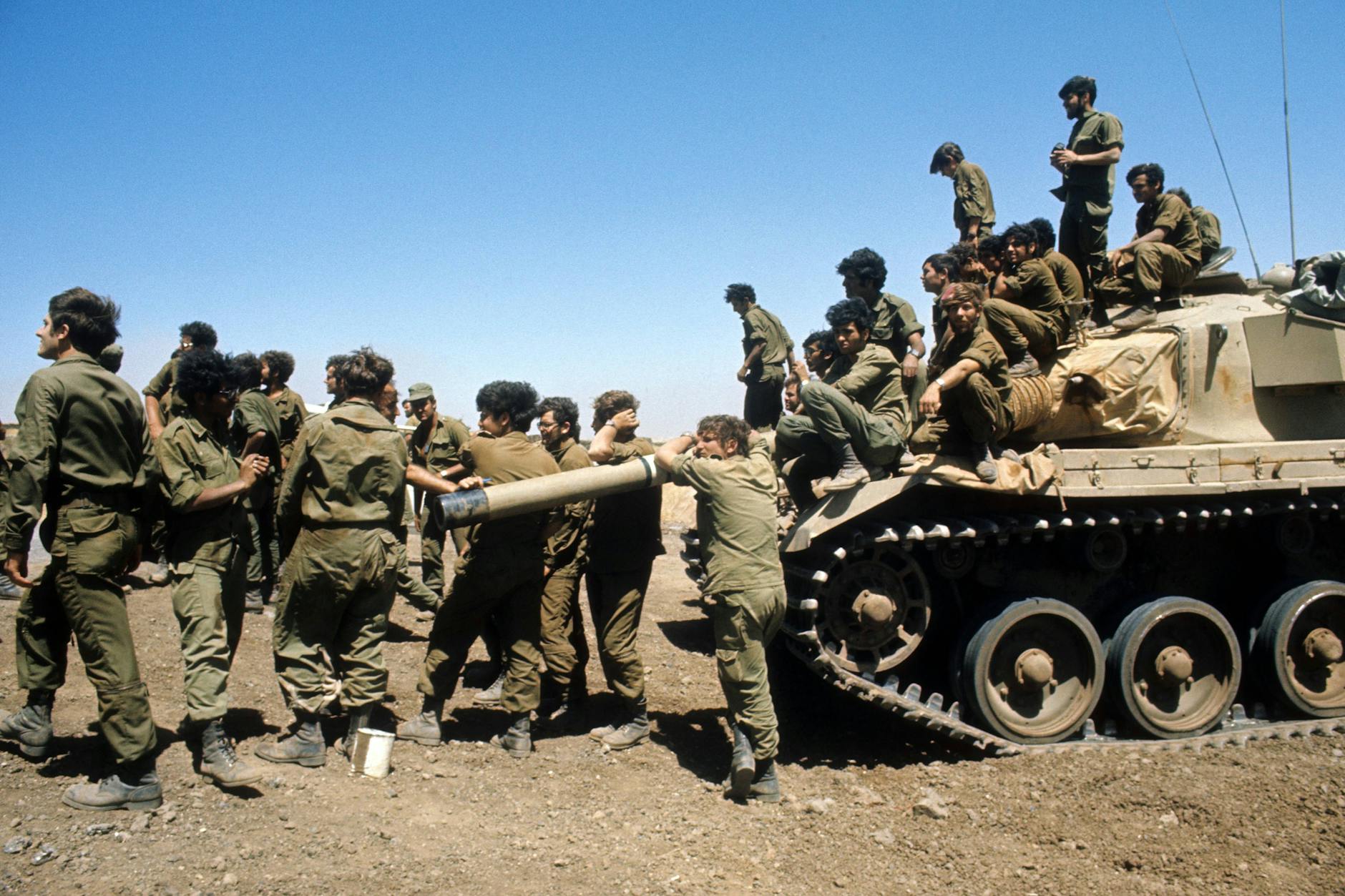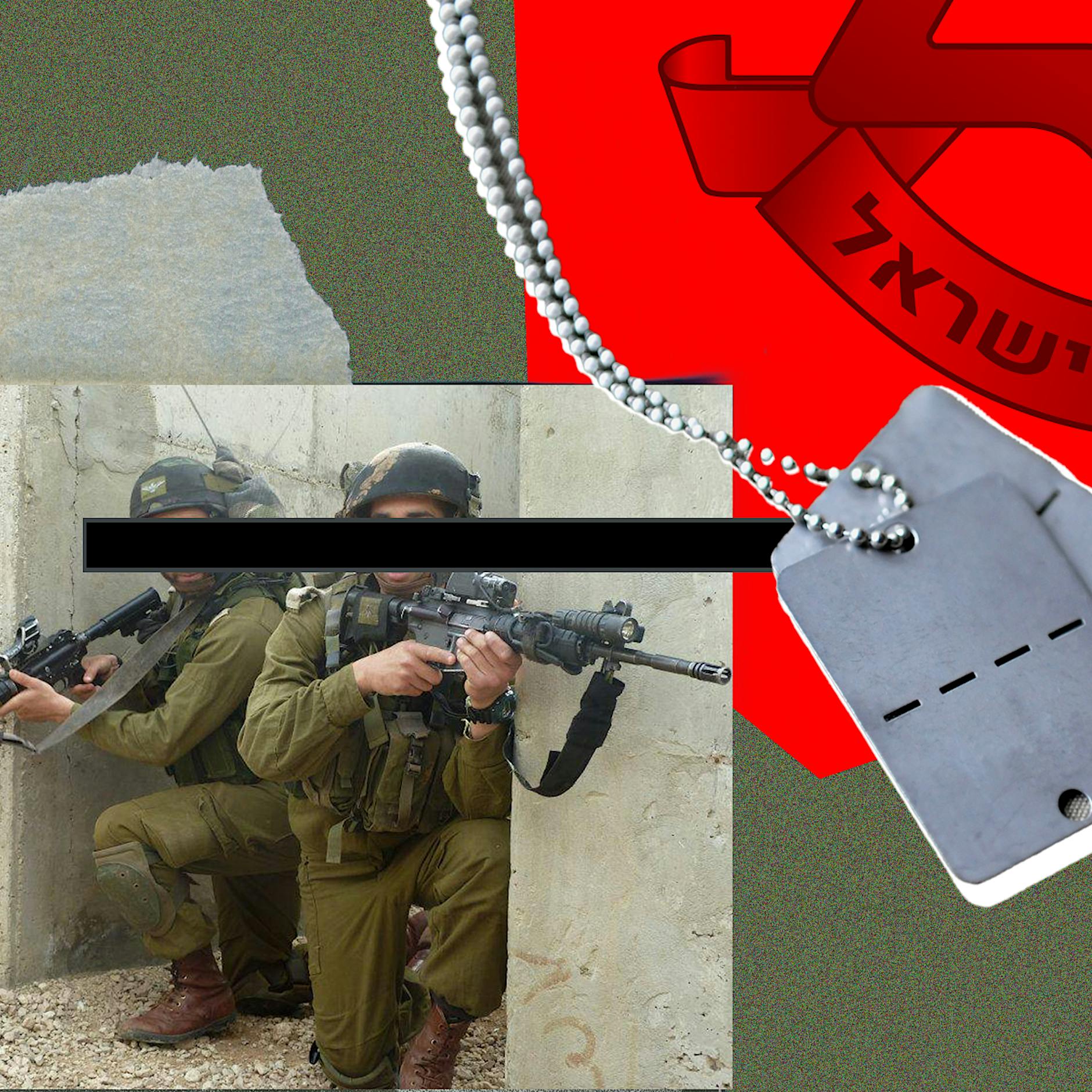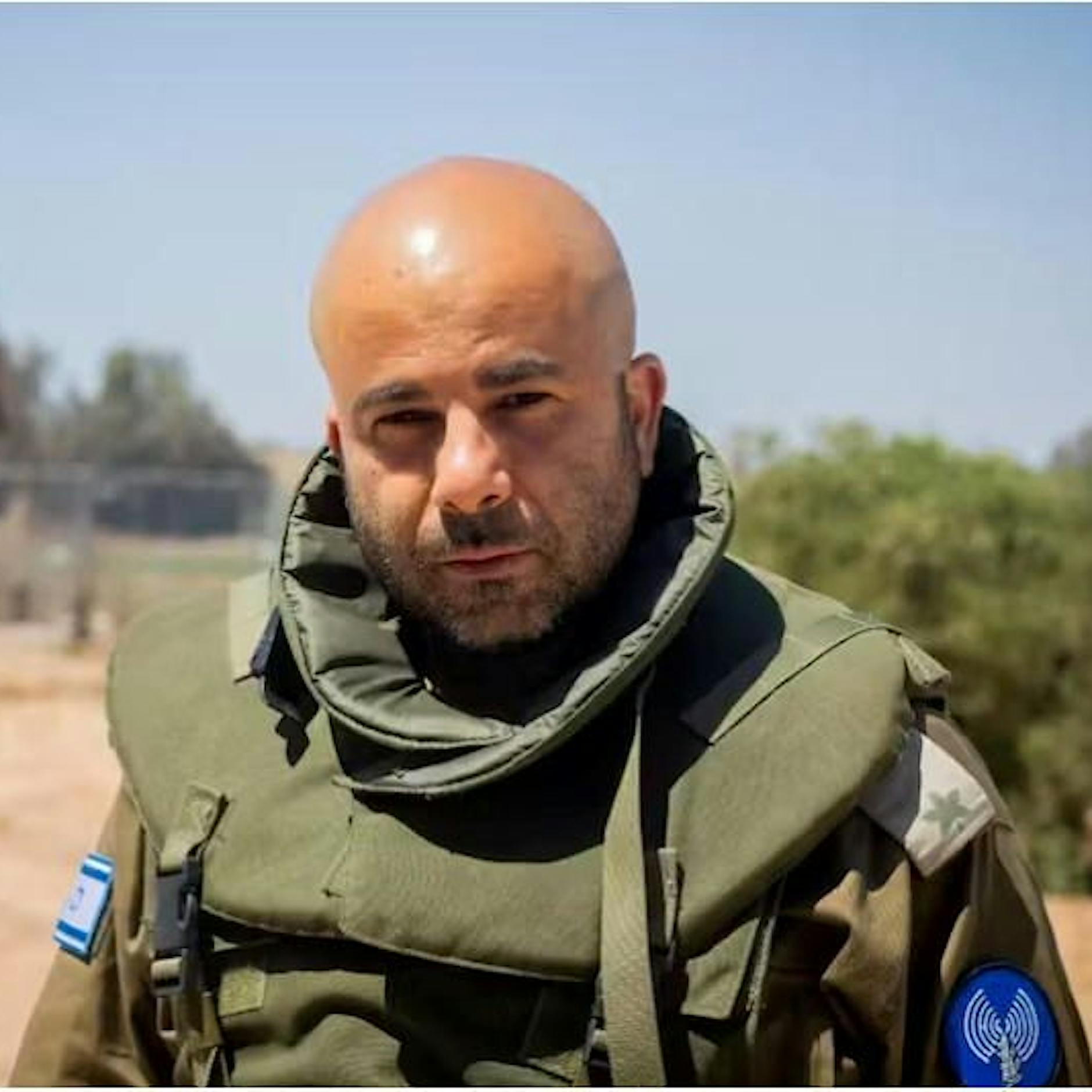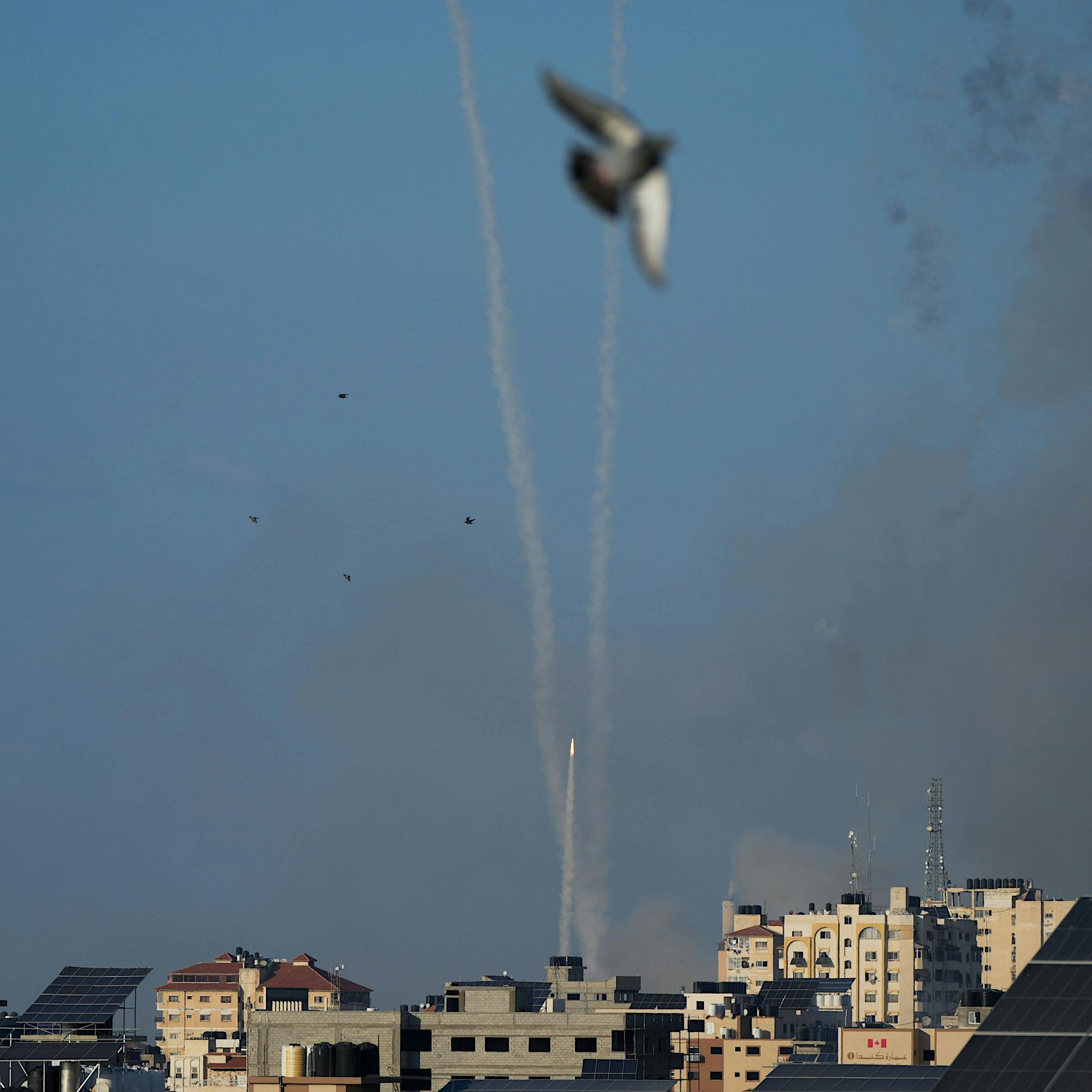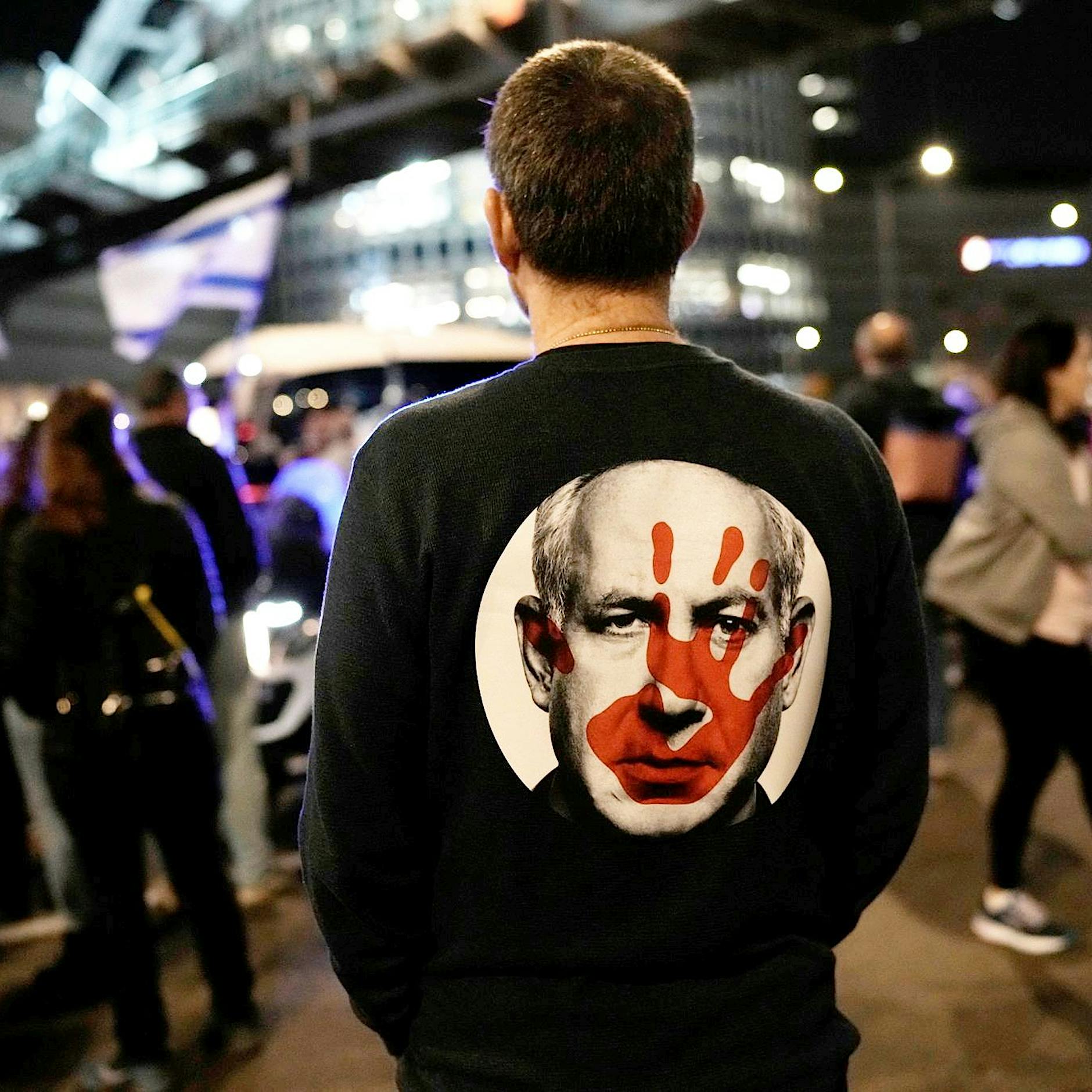Not long ago, in April this year, I visited the café in the Jewish Museum in Berlin to enjoy an Americano. A German woman served me my coffee. As I glanced at her, I noticed a metal necklace adorned with a disc, reminiscing of the one I had worn during my time as a soldier. However, engraved on her metal disc were the words „My heart is kidnapped in Gaza.“ Intrigued, I struck up a conversation with her.
I shared with her how I hadn't seen such metal plates worn by soldiers for many years. She smiled warmly and replied, „I even wear clothes in the color of soldiers' uniforms.“ She was indeed wearing a dark green dress.
I told her that since the end of my army service I had been refusing to wear clothes of this color and that just lately I had had to bring back the green jeans I had got as gift from my partner for Easter. I couldn't help but start crying. That was when some piece of trauma came up.
Sie erhalten eine Bestätigung per E-Mail.
One song began to resound in me.
When I was drafted into the IDF (1990-1993), I lacked critical awareness and chose to serve in the Artillery Corps. It wasn't until I arrived at the training base in the yellow expanse of the Negev Desert in southern Israel that I realized I had made a mistake.
Within a short time, I went through a transition from a staunch believer in the values of the democratic society, that had been instilled in me during my high school years, to a realist, who understood that my rights had been stripped away. Suddenly I felt like a part of a dictatorial system where only the strong soldiers could survive. The commanders quickly noticed my tendencies to daydream and perceived me as weak.
Then, on my first break from the army I bought a ticket to see the rock show of the two Israeli musicians Rami Fortis and Berry Sakharof performing their new album „Stories from the Box.“ In one of the songs, Rami Fortis sang:
„The king from here, and the queen from there,
Immerse themselves deeply in blood...
The Greats of the Nation promise to breathe life into the wilderness,
Blowing slogans, blowing bubbles,
The crowd cheers and waves flags,
In the basements, below the ground, they are beheading....,
Circus of fools and entry is free...“
(Rami Fortis, „Shoes“, 1992; translated by Mati Shemoelof)
Fortis was a prophet. He warned us about the future.
Whereas I danced actively and intensely, the crowd was losing their mind during the show. They were shouting to Fortis that he was crazy. He was truly ecstatic in a manner that had never been seen on Israeli stages before. He was making all kinds of facial expressions and gave an excessive performance throughout his rock concert.
Today I think Fortis was like a prophet – with his music he wanted to warn us about the future. We had been living in the shadow of the first Intifada and the Gulf War and the Oslo peace process had not yet begun.
We didn't anticipate that on the seventh of October 2023, Israeli people would be slaughtered by the Hamas terrorists. As the song goes:
„In the basements, below the ground, they are beheading....,
Circus of fools and entry is free...“
And indeed, it's a circus of fools: The Hamas, Netanyahu and his extreme nationalist government - the entire region is heading into an abyss.
After the rock show was over, I lied to the army authorities, claiming that I was sick. I didn’t want to return to the base. Instead, I went to another show with the same band. I listened to the same song. The refrain went like this:
Shoes, shoes, and a refrigerator and a refrigerator
that will cool my brain
I want to forget -... shoes…
Only then I returned to the training of the tank unit, where I learned how to shoot this massive steel machine – The „Merkava“. The chorus of the song continued to play in my ears like an earworm:
„Shoes, shoes,
And a refrigerator to cool my brain…“
Later they found out about my lying and had a punishment coming for me.
Many people in Israel suffer from post-traumatic stress disorder
Rami Fortis once said that he had returned from the battles of the 1973 war with a post-traumatic stress disorder. He added that he didn’t know anything about the war. While he was still listening to Pink Floyd, the war started and immediately he was sent to the yellow deserts of Sinai to fight the Egyptian army, seeing an endless rain of bombs, one of which killed his best friend; and that sound of those falling bombs never left him.
Fortis also said that most people in Israel were affected by being directly or indirectly by the post-traumatic stress disorder. When I checked the data from a study carried out in 2022, it showed that about 93% of the discharged Israeli fighters reported that they had been exposed to an event of a traumatic nature. In some cases, a trigger may appear several years after an event.
„Shoes, and a refrigerator that will cool my brain,
I want to forget, shoes…“
Rami Fortis asks to give him a pair of shoes and a refrigerator. Some shoes, to walk as far as possible from the hot sands of the Sinai desert, the place of trauma. And a refrigerator, to cool the brain, not only because he fights in the hot surfaces but also because he wants to forget.
I don’t think that I remembered Fortis’s song by accident. Fortis was one of the founders of „Minimal Compact“, the band that was very successful in the end of the eighties in Europe. But he returned to live in Israel. He had been in Berlin before me and had written about the city just like me; And we both can’t forget the horror of the other place.
I took my shoes and went far from Israel, and I do live in a cool place, married and now a father with a literary career. And even though I can peacefully drink an Americano at a café in Berlin, a small necklace with a metal plate can bring it all back. People come and people go, and I'm stuck in one place, trapped inside the anxieties that suddenly send me away to cryptic boxes of memories. The doors of my consciousness are opening with fright.
I was locked up in a cell in the military prison
I remember how we with our tanks once shot mistakenly a family of pigs that was walking in line one after another in southern Lebanon, because we thought they were Hezbollah terrorists.
I remember how I cried to my mother to take me out of the army, because I was abused, mentally, day after day. But she told me that if I hadn’t finished the military service, I wouldn't have been able to find a job.
I remember how once I got a task to check the condition of the empty water reservoirs in some tanks. In the report I had to submit, I discovered a requirement for a doctor's signature to validate the reservoirs' condition. My commander disregarded this detail, insisting that I had to sign the report and assuring me that everything would be resolved. However, unwilling to take responsibility for the tanks' water reservoirs without proper validation, I refused to sign. That defiance led to me getting confined in a military prison cell.
Of course, they found another, official reason: One day I went to take a shower. I left my weapon in an open room. Later, my commander summoned me and accused me of abandoning my personal gun. I countered, stating that every soldier took a shower without their weapon. Despite my attempts to defend myself, I was sentenced to three weeks in military prison that very night.
After my release from prison, I decided to celebrate with friends at a bar in downtown Hadar, Haifa. I'll never forget how I went out to buy cigarettes in the middle of the night. The experience in prison was still so close. In prison I couldn't even pee without five other people hearing me…
As I rushed out to buy cigarettes, the exhilaration of freedom overwhelmed me, and I leaped in joy. However, in my exuberance, I misjudged the height, and a low rooftop from the local market sliced my skull that night. I returned to the base, bruised and disheartened.
I was reminded of the philosopher Slavoj Žižek
I was reminded of the Slovenian philosopher Slavoj Žižek. He writes that we must accept that our lives contain a traumatic core that defies redemption; that there is a dimension of our being that forever resists complete liberation.
My weekend lie, which allowed me to go to another concert, also caught up with me again: When I finished my army service at the IDF, my commanders somehow knew that I had only pretended to be sick to stay at home. All the soldiers in my unit got the last month off their three years’ service. I got to do the full three years and a day.
After that, I went to a therapist and asked if he would help me get out of my army service for good. Implying that I wouldn’t have to do reserve for one month every year. I succeeded. I was never drafted again.
And yet: a chance encounter at a café, a glance at the tragic news about the Gaza war - and everything comes back to me.
Mati Shemoelof, born in 1972, is an award-winning writer, poet, activist, author and curator. This year (2024) he has received a grant from the German Literature Fund to write his first book in German: ‚Yiddish Sounds, German Words‘.
This is a contribution that was submitted via our Open Source initiative. With Open Source, the Berliner Verlag gives all interested parties the opportunity to offer texts with content relevance and professional quality standards. Selected contributions will be published and honoured.
